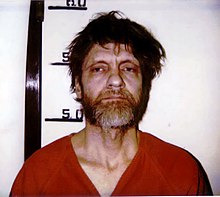Theodore J. Kaczynski
| Ted Kaczynski | |
|---|---|

Kaczynski after his capture by police, 1996
|
|
| Born |
Theodore John Kaczynski May 22, 1942 Chicago, Illinois, U.S. |
| Other names | The Unabomber |
| Education |
Harvard University (1958–62) University of Michigan (1962–67) |
| Occupation | Mathematician |
| Notable work | Industrial Society and Its Future (1995) |
| Home town | Evergreen Park, Illinois |
| Criminal penalty | 8 consecutive life sentences without the possibility of parole |
| Criminal status | Incarcerated at ADX Florence, #04475–046 |
| Conviction(s) | 10 counts of transportation, mailing and use of bombs; 3 counts of murder |
| Killings | |
|
Span of killings
|
1978–1995 |
| Killed | 3 |
| Injured | 23 |
|
Date apprehended
|
April 3, 1996 |
Theodore John Kaczynski (/kəˈzɪnski/; born May 22, 1942), also known as the Unabomber, is an American mathematician, anarchist and domestic terrorist. A mathematical prodigy, he abandoned a promising academic career in 1969, then between 1978 and 1995 killed 3 people, and injured 23 others, in a nationwide mail bombing campaign that targeted people involved with modern technology. In conjunction with the bombing campaign, he issued a wide-ranging social critique opposing industrialization and advancing a nature-centered form of anarchism.
Raised in Evergreen Park, Illinois, Kaczynski was a child prodigy and accepted into Harvard University at the age of 16. He earned his B.A. from Harvard in 1962, then his M.A. and Ph.D in mathematics from the University of Michigan in 1965 and 1967, respectively. After receiving his doctorate at age 25, he became an assistant professor at the University of California, Berkeley but resigned abruptly two years later. As an undergraduate at Harvard, Kaczynski was a research subject in an ethically questionable experiment conducted by psychology professor Henry Murray, which some analysts have suggested influenced Kaczynski's later actions.
In 1971, he moved to a remote cabin without electricity or running water in Lincoln, Montana, where he lived as a recluse while learning survival skills in an attempt to become self-sufficient. In 1978, after witnessing the destruction of the wildland surrounding his cabin, he concluded that living in nature was untenable and began his bombing campaign. In 1995, Kaczynski sent a letter to The New York Times and promised to "desist from terrorism" if the Times or The Washington Post published his manifesto, Industrial Society and Its Future, in which he argued that his bombings were extreme but necessary to attract attention to the erosion of human freedom and dignity by modern technologies that require large-scale organization.
...
Wikipedia
